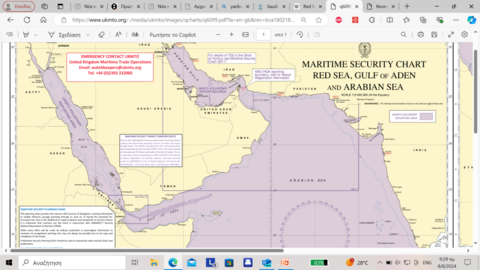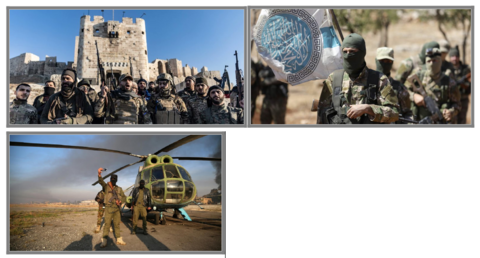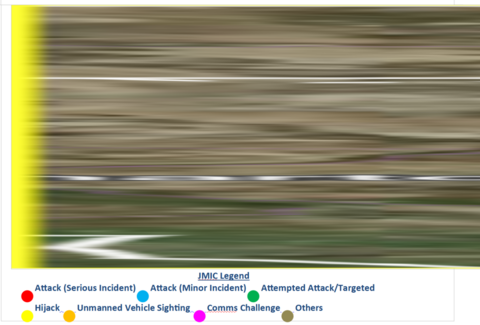
Brief Update No 24/010 Date: 05 – Dec – 2024
STATEMENT
This document has been approved for distribution by Sea Guardian S.G. Ltd / Operations Department. The provided Intel and information derive from open sources, the Joint Maritime Information Center (JMIC) and United Kingdom Maritime Trade Operations (UKMTO) respective WebPages and products. All rights reserved. No part of this Risk Assessment may be reproduced in any form: electronic, mechanical, or other means without written permission by Sea Guardian S.G. Ltd. Under no Circumstances can Sea Guardian S.G. Ltd be held responsible for any loss or damage caused by a reader’s reliance on information obtained by this Assessment.
Objectives
The purpose of this brief is to provide the Maritime Industry and the Security Stakeholders with:
- Major maritime security incident summary and analysis for the time period 21 Nov – 03 Dec 2024
- Overview of risk assessment and relevant information, in order to support operational planning and decision making.
- Threat assessment updates concerning military operations – terrorism – piracy and also cargo theft, smuggling, stowaways

RECENT KEY DEVELOPMENTS
- On Nov 21, the International Court of Justice, issued arrest warrants for Hamas armed wing leader Mohammed Diab Ibrahim al-Masri, Mohammed Deif, Israeli Prime Minister Benjamin Netanyahu and the former Israeli Defense Minister Yoav Galad.

- On Nov 23, sources indicated that Israel is exploring setting up a forward military base in Somaliland, a part of Somalia that declared its independency, in order to monitor the Houthis in Yemen and the Bab al-Mandab Strait.

- On Nov 26, in an address after a meeting of the government’s national Security Council that approved the draft ceasefire agreement in Lebanon, Israeli Prime Minister Benjamin Netanyahu warned Hezbollah that if it did not respect the terms of the ceasefire then Israel would immediately launch new attacks against it. “We are changing the face of the Middle East,” Netanyahu said, adding that the ceasefire in Lebanon would allow Israel to focus its attention on the Iranian threat. He also issued a stern warning to Syria, saying that the Assad regime was playing with fire.
- On 0400 Nov 27, Israel and Hezbollah began implementing a ceasefire as part of a US-proposed 60-day ceasefire to end more than a year of hostilities. The ceasefire stipulates that Israel will not carry out offensive military operations against political, military or other state targets in Lebanon, while Lebanon will prevent any armed groups, including Hezbollah, from conducting operations against Israel. According to a US official the agreement, which its contents have not been made public, envisages the IDF has sixty days to gradually withdraw its units from the Lebanese territory. Hezbollah fighters must also withdraw from the border with Israel, taking their heavy weapons with them. However, shortly after the ceasefire began, the two sides began accusing each other of ceasefire violations.

- On Nov 27, the U.S. National Security Adviser Jake Sullivan said that President Joe Biden will renew efforts to reach a ceasefire agreement and free hostages in the Gaza Strip, following the ceasefire between Israel and Hezbollah in Lebanon.
- On November 27, an alliance of jihadists and Syrian rebels dominated by Hayat Tahrir al-Sham (HTS), the former Syrian arm of al-Qaeda, launched a surprise offensive act in northwestern Syria and seized dozens of communities, including most of Aleppo by Nov 30, with the exception of northern neighborhoods, where mostly Kurds live, before continuing to advance southward towards the city of Hama. These groups according to Syrian sources, began preparations to capture Aleppo a year ago, but the operation was delayed by the war in the Gaza Strip. Finally, the attack began last week after the agreed ceasefire in Lebanon. The rapid advance of the jihadists was made possible due to the attention of Hezbollah and other Iranian-backed fighters dispatched in Lebanon. For the first time since the outbreak of war in Syria in spring 2011, the Syrian regime lost control of the whole of Aleppo, the country’s second-largest urban center following a large-scale offensive by jihadists and rebels allied with them. In return, Russian and Syrian air forces bombed areas controlled by these groups in Idlib province and neighboring Aleppo province. The Assad regime backed by Russia and Iran is reported to preparing for a counter attack that would repeal the attackers.

- On Nov 28, one day after the ceasefire between Israel and Hezbollah in Lebanon came into force, Yemen’s Houthi leader Abdel Malek al-Houthi declared that operations to support the Palestinian people by firing missiles or drones will continue.
- On Nov 29, Iran, Germany, France and Britain agreed to continue “diplomatic dialogue” after their representatives held “frank” talks in Geneva on Nov 28 on Tehran’s nuclear program, two months before Donald Trump returns to the White House.
- On Dec 01, Israel claimed it had carried out airstrikes against Hezbollah positions in Lebanon, calling into question a fragile ceasefire agreement with the Lebanese Shiite movement that took effect on Nov 27.
- On Dec 01, Jake Sullivan, the White House national security adviser, said that the United States is “actively working” to implement a ceasefire between Israel and Hamas in Gaza, but “we’re not there yet”.
- On Dec 01, according to Syrian army sources, Russian and Syrian warplanes struck the rebel-held city of Idlib, aiming at pushing back rebel forces deployed in the city of Aleppo.

- On Dec 01, the group’s spokesman Yahya Sharrea said that the Houthis launched a military operation against a “vital target” in central Israel using a hypersonic missile, adding that the group will continue its attacks until “Israeli aggression in the Gaza Strip ends and the siege is lifted”. Earlier in the day, the IDF claimed that Israeli air defense systems intercepted a projectile fired from Yemen before it entered Israeli territory.

- On Dec 01, two officials from Hamas reported to AFP (French Press Agency) that a Hamas delegation discussed a ceasefire in the Gaza Strip with Egyptian officials in Cairo. An Egyptian-sponsored meeting was also held on Dec 01 between representatives of Hamas and the rival Fatah formation on the issue of governance of Gaza after the end of the war with Israel.
- On Dec 02, U.S. Headquarters (CENTCOM) announced that U.S. Navy destroyers USS Stockdale and USS O’Kane successfully destroyed a number of weapons fired by the Houthis during their passage into the Gulf of Aden from Nov 30 to December 1. The destroyers escorted three U.S.-owned and flagged merchant ships, and the attacks caused no injuries or damage to any ship, whether U.S. civilian or navy. The destroyers successfully countered and destroyed three anti-ship ballistic missiles, three drones and one surface-to-surface missile.
- On Dec 02 according to sources, there are indications that Russia may be starting the evacuation of its naval vessels from Russia’s naval base in Tartus, which is a crucial point in support of the Assad regime and Russia’s ambitions on the international stage. It seems that the sudden change in front lines in Syria has put this base at risk.
- On 03 Dec, in the Red Sea northern sector, an Israeli Navy frigate intercepted a UAV launched from the east.
- On 03 Dec, the transfer 150,000 tons of crude oil (1,000,000 barrels) from the Greek-owned tanker “Sounion” to the tanker “Delta Blue” at the anchorage of Suez had been completed. The Houthis had struck the ship on August 21 and it was not until mid Sep that it was salvaged safely in order to be moved to a safe port.

- On Dec 03, U.S. Pentagon claimed that US air strikes had destroyed rocket launchers mounted on trucks, tanks and mortars in areas in eastern Syria that posed a “clear and immediate threat.”
- On Dec 03, U.S. President-elected Donald Trump has issued a stern message to Hamas, urging it to release the hostages it is still holding until his inauguration on Jan 20, saying otherwise it would “pay dearly.” The next day Israeli Prime Minister Benjamin Netanyahu thanked him for issuing such a harsh statement and said that “President Trump emphasizes the right spot, Hamas, and not the Israeli government, as is customary (elsewhere),”. He also added that Israel was committed to its ceasefire agreement with Hezbollah, but warned that this did not mean the war was over.
- During Dec 03, sources indicated that Assad has reached out to Israel for support against the rebels. In exchange, Israel reportedly demanded the withdrawal of Iranian forces from Syria and outreach efforts to the Kurds. Israeli sources warn that the potential collapse of the Assad regime could lead to chaos, with significant security implications.
MARITIME SECURITY INCIDENTS: 21 Nov – 03 Dec 241
| INCIDENT No | INCIDENT Type | INCIDENT TIME | INCIDENT DETAILS |
| UKMTO Incident No 136 | ATTACK | 010932UTC Dec 2024 | UKMTO has received a report of an incident 80NM south of Aden, Yemen. Authorities are investigating. |
| JMIC Incident No. 110 (Ref. UKMTO Warning Incident 135) | SUSPICIOUS ACTIVITY against M/Y Triple Seven at the Gulf of Aden | 210330UTC Nov 2024 | The Master of the M/Y TRIPLE SEVEN (IMO: 9374894) reported suspicious activity when approached by several small craft. At 0330 (Z), while transiting with AIS on approximately 35 NM northeast of Obock, Djibouti, the Master onboard M/Y Triple Seven reported that over the period of about 5 hours the vessel was repeatedly approached by up to 12 small craft. The vessel increased speed and conducted evasive maneuvers. All crew and the vessel are safe and is proceeding to the next port of call. The JMIC has investigated and it was inconclusive if the incident was related to Houthi or Piracy activities. The vessel does have direct US and UK association. |
1 In accordance to JMIC and/or UKMTO sources

a
THREAT ASSESSMENT UPDATE:
Military operations – terrorism – piracy and also cargo theft, smuggling, stowaways
Military Operations
The new front in northern Syria which opened on Nov 27, is added to the general military conflict and unrest that takes place in the middle east region, affecting also the East Mediterranean Sea.
Terrorism – piracy and also cargo theft, smuggling, stowaways
- The suspicious activity against M/Y TRIPLE SEVEN could be related to Piracy activities.
- The reemergence of terrorists group associated with ISIS and Al Qaeda in Syria on Nov 27, has enhanced the terrorist threat level across East Mediterranean Sea.
RISK ASSESSMENT
- The risk of attacks or incidents in the East Mediterranean Sea and Northern Red Sea for the time being is assessed Low with the exception of all Israeli ports and the Syrian Coastline. Any port call should be arranged after a direct contact with the Israeli or Syrian authorities.
- The Bab-el-Mandeb Strait, the southernmost part of the Rea Sea and the eastern part of the Gulf of Aden are still assessed to be the most hazardous areas, with three significant incidents occurring during last period, one of which involved US merchant ships escorted by USN warships.
- The pattern of the recent Houthi attacks indicates that their latest strategy favors the conduct of multiple attacks by ASBM, UAVs and cruise missiles at great distances.
- It is almost certain that no matter if the Conflict in Gaza and Lebanon draws to a ceasefire or at an end, the Houthis will resume their disruptive campaign against merchant shipping.
- Marine Traffic through the Bab-el-Mandeb Straits has been constantly decreasing and it recently dropped down nearly 70%, in comparison to figures before the Red Sea Crisis, with the majority of shipping transiting through the Cape of Good Hope.
- As targets of opportunity for the Houthis diminish due to the decrease of Marine Traffic through the Bab-el-Mandeb Strait, it is assessed that vessels with multiple layers of indirect associations to Israel, Us or UK will be targeted ever more frequently. Maritime industry stakeholders should take into account such associations when conducting threat and risk assessments.
- It is assessed that the US and UK airstrike campaign along with the naval USN and RN buildup in the area and the deployment of warships of international/EU maritime Operations “PROSPERITY GUARDIAN” and “ASPIDES”, have proved to be ineffective and have not mitigated enough the Houthi threat against merchant shipping bringing the Bab-el-Mandeb Straits essentially under Houthi control. This goes hand to hand with the notion that the Houthis have found a way to monetize this blockade of the Red Sea for “safe passage” as a new “economic endeavor”.
- Is seems that the Houthis have gradually become a key player within the region and the key proxy organization for Iran’s geopolitical polities.
- Taking into account the fact that the Houthis are essentially in control of two (Suez canal – Bab-el-Mandeb Straits) out of eight major choke points for marine traffic worldwide, it seems that the international community so far has shown little effort to fully comprehend and counter their threat.
- The new rise of terrorist groups in northern Syria could potentially be dangerous for merchant shipping security along the Syrian coastline and destabilizes the security environment in the region even further.
- A potential collapse of the Assad regime could lead to chaos, with significant security implications for the whole Middle East Region.
- It is likely to see over the next days the United States lifting sanctions on Syria, if Assad will decide to distance himself from Iran, halting weapons transfers to Hezbollah.

- It is assessed that the Israeli government, for the time being and until January 2025 when the new US President assumes duties, will avoid further escalation with Iran and Hezbollah. Israel will upkeep the ceasefire in Lebanon and will even promote the idea of a cease fire in Gaza, if the Israeli hostages are released. However, this does not exclude the possibility of a new and more far-reaching attack against Iran and its’ proxies in case of another Iranian attack, especially now that the Israeli prime minister feels confident that Trump is openly supporting him.
- The current situation around the seas of the Arabic Peninsula will continue the months to come to create risk for the shipping industry and will deter vessels to cross the Red Sea and the Suez Canal. It is assessed that the situation will not improve significantly, at least till summer of 2025.
Sea Guardian S.G. Ltd / Intel Department (www.sguardian.com / +30 6944373465) can support your operational planning, assist in determining the risk assessment and provide assistance in decision making by producing tailored made assessments upon request on ports in the region, on routes, on cargos and specific merchant vessels.
You can refer to our Threat & Risk assessment analysis brief No 24/001//10 Sep 24 for more information and background analysis on the events and situation in the region.
- Viewers can read here below the last report: https://allaboutshipping.co.uk/2024/11/22/sea-guardian-threat-risk-assessment-06-13-nov-2024-2/





